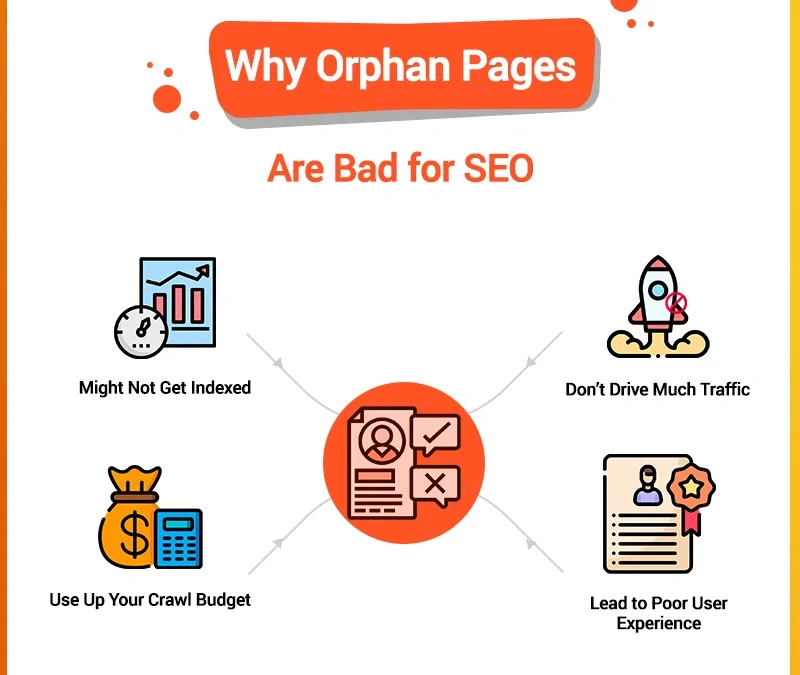Why Orphan Pages are Bad for SEO
Orphan pages are those that are not linked to any other pages on your website. This can be a problem for search engine optimization (SEO) because it means that search engine crawlers may not be able to discover and index those pages. This can make it difficult for people to find those pages through search engines, which can negatively impact the visibility and traffic of your website. It’s important to make sure that all of the pages on your website are properly linked to each other, so that search engines can easily discover and index them.
What are Orphan Pages?
An orphan page is a web page that is not linked to any other pages on a website. This means that it is not accessible through the website’s navigation menu or through any other internal links on the site. As a result, these pages are only accessible if someone already knows the exact URL of the page or if they find it through an external source, such as a search engine.
Orphan vs Dead Pages
Orphan pages and dead pages are similar in that they are both pages on a website that are not linked to any other pages on the site. However, there is a key difference between the two. A dead page is a page that used to be part of the website but has since been removed or deleted. An orphan page, on the other hand, is a page that was never linked to any other pages on the website, either because it was created that way or because the links to it were removed at some point.
Reasons for Orphan Pages
There are a few reasons why orphan pages might exist on a website. Here are a few possibilities:
- The page was intentionally created as an orphan page. This might be the case if the page is meant to be accessed only through a specific URL or if it is meant to be hidden from the general public.
- The page was linked to at some point, but the links were later removed. This could happen if the website was redesigned or if the content on the page was moved to a different location.
- The page was created by mistake and was never linked to any other pages. This might happen if the person creating the page forgot to add links to it, or if the page was created automatically by a website platform without any links being added.
Regardless of the reason, it’s important to make sure that all pages on your website are properly linked, so that search engines can discover and index them. This will help improve the visibility and traffic of your website.
How Orphan Pages are Bad for SEO
Orphan pages can be bad for SEO because they are not linked to any other pages on your website. This means that search engine crawlers may not be able to discover and index those pages, which can make it difficult for people to find them through search engines. This can lead to lower visibility and traffic for your website. When search engine crawlers visit your website, they typically follow the links on each page to discover new content. If a page is not linked to any other pages, the crawlers will not be able to discover it. As a result, the page will not be included in the search engine’s index, and it will not show up in search results. In addition, having orphan pages on your website can also create a poor user experience. If someone lands on an orphan page through a search engine or external link, they may not be able to navigate to other pages on your website because there are no links to follow. This can lead to confusion and frustration, which can cause them to leave your site. Overall, it’s important to make sure that all of the pages on your website are properly linked to each other, so that search engines can discover and index them and so that users can easily navigate your site. This will help improve the visibility and traffic of your website, and it will provide a better user experience.
Identifying Every Orphan Page on Your Website
To identify every orphan page on your website, you can follow these steps:
- Start by creating a sitemap of your website. A sitemap is a list of all the pages on your website, along with the links between them. This will give you an overview of the structure of your site and help you identify any pages that are not linked to any other pages.
- Next, use a website crawler tool to scan your website. A website crawler tool, also known as a spider or a bot, is a program that can scan your website and follow the links on each page to discover new content. This will allow you to see all of the pages on your site and identify any that are not linked to any other pages.
- Once you have identified all of the orphan pages on your website, you can take steps to link them to other pages on your site. This will make it easier for search engine crawlers to discover and index those pages, and it will improve the user experience of your website.
Alternatively, you can also use a tool like Screaming Frog to scan your website and identify any orphan pages. This tool will provide a list of all the pages on your site and will highlight any pages that are not linked to any other pages, making it easy to identify and fix any orphan pages.
Fixing Orphan Pages
To fix orphan pages on your website, you can follow these steps:
- First, identify all of the orphan pages on your website using a sitemap, a website crawler tool, or a tool like Screaming Frog.
- Once you have identified the orphan pages, assess the content on each page and determine if it is still relevant and useful. If the content is outdated or no longer useful, consider deleting the page from your website.
- If the content on the orphan page is still relevant and useful, you will need to add links to that page from other pages on your website. You can do this by adding a link to the orphan page in the navigation menu, or by adding a link to it from other relevant pages on your site.
- After you have added links to the orphan page, you will need to submit the updated sitemap to the search engines. This will help the search engines discover and index the newly linked pages, which will improve the visibility and traffic of your website.
- Finally, test the links to the orphan page to make sure that they are working properly. This will help ensure that users can easily navigate to the page from other parts of your website.
Overall, fixing orphan pages on your website is an important part of maintaining a good SEO strategy. By ensuring that all of your pages are properly linked, you can make it easier for search engines to discover and index your content, which will improve the visibility and traffic of your website. Orphan pages are web pages that are not linked to any other pages on a website. This can be a problem for SEO because it means that search engines may not be able to discover and index those pages, which can lead to lower visibility and traffic for the website. To fix orphan pages, you can identify them using a sitemap, a website crawler tool, or a tool like Screaming Frog. Then, you can add links to those pages from other pages on your website, submit an updated sitemap to the search engines, and test the links to make sure they are working properly. By taking these steps, you can improve the SEO of your website and provide a better user experience.











